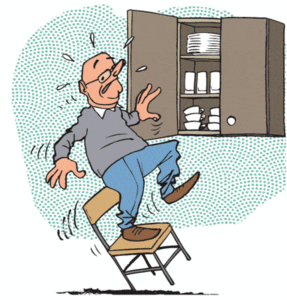Careful, don’t fall down
Jul 29, 2024
 Lately we have been seeing quite a few people in our alarm service who have fallen in or around their home.
Lately we have been seeing quite a few people in our alarm service who have fallen in or around their home.
Although most escape unscathed, there are also those who have to go to the hospital with a broken hip/leg/arm.
A fall often causes a lot of pain. On the one hand, physical pain, due to bruises or a fracture. But on the other hand, also mental pain, because elderly people who have fallen are often afraid of falling again. That fear causes them to avoid certain situations or activities. This often leads to loneliness and poorer condition. Fortunately, you can do a lot to prevent falls.
Tips to prevent falls:
Stay active. An exercise program to prevent falls has several benefits. This allows elderly people to continue to move independently and they also train their balance and muscle strength.
Make the house safe. Think of a well-lit house, with safe stairs and equipment to prevent slipping. Our nurse can advise on this
Medicine check Some medicines affect blood pressure, balance or the brain. Do you use multiple medications at the same time? Then there is more chance of falling. Therefore, discuss the use of medication regularly with your doctor.
Check eyes. Being able to see clearly is very important for good balance. Therefore, check the eyes regularly. Spare glasses are also recommended.
Sturdy and appropriate shoes Wear sturdy and appropriate shoes when you are indoors. Also make sure there is sufficient profile and a low heel. This means you have less chance of slipping.
Good and healthy diet Good and healthy diet helps to keep muscles and bones strong. It is therefore important to eat enough. With enough proteins, vitamins and minerals. If you don’t feel like cooking yourself, you can have a hot meal served at home every day by Chef Hendrik https://www.facebook.com/chefhendrikcuracao
Tools to work on fall prevention
Elderly people are often unaware of an increased risk of falls. Do they feel good?
Some people think that more exercise and extra measures are not necessary for them. While elderly people who have difficulty walking often do not feel like exercising anymore. Especially if they have already fallen.
Many elderly people also don’t know where to start. Here we share a number of resources for the elderly and for caregivers.
Primary care providers, such as general practitioners and physiotherapists, can easily estimate a higher risk of falls.
They do this by asking two questions: Have you fallen in the past 12 months? Do you have difficulty moving, walking or keeping balance?
If a higher risk of falling is identified, the older person is referred to physio for guidance.
Ask our nurse for advice on how fall hazard your home is.
Remove all loose carpets from your home
Make sure you always wear good shoes, even if it is only for a short distance in the house
Together with the physio or nurse, look for the right aids if necessary (and use them) such as a walking stick with sturdy caps, walking frame or walker.
Never walk on a wet floor
If you feel dizzy, always ask someone to walk with you.
Consider a medical alarm from Carin Cares to receive help quickly in an emergency
Under no circumstances should you climb on chairs or other unstable stools that increase the risk of falling.
 Lately we have been seeing quite a few people in our alarm service who have fallen in or around their home.
Lately we have been seeing quite a few people in our alarm service who have fallen in or around their home.